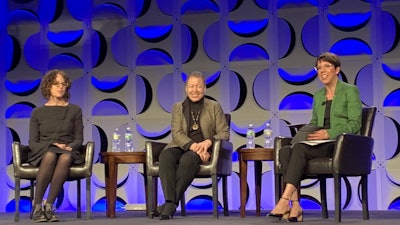In a discussion titled, “Talking About Race,” that took place on Monday at the American Council on Education, Dr. Beverly Daniel Tatum and Dr. Robin DiAngelo said that not enough is being done on campuses to push a needed dialogue on this topic forward.
 Drs. Robin DiAngelo and Beverly Daniel Tatum engage in a discussion with Lorelle Espinosa, Vice President of Research at ACE.
Drs. Robin DiAngelo and Beverly Daniel Tatum engage in a discussion with Lorelle Espinosa, Vice President of Research at ACE.
“When you graduate from an institution of higher learning, you are technically certified as highly educated, and yet you can graduate from virtually any program in this country with absolutely no ability whatsoever to engage with any complexity and nuance in conversations about race,” said DiAngelo, who is the author of White Fragility: Why It’s So Hard For White People to Talk About Racism. “And you can be seen as qualified to teach and lead with no ability to engage with nuance or complexity. I think we need to see that as you’re not qualified to teach or lead.”
DiAngelo, who is an associate professor of education at the University of Washington said that White fragility is commonplace in society, particularly higher education.
“When I first coined that term White fragility, I was trying to put language to a really, really familiar phenomena and that is, how defensive we White people get whenever our positions, our advantages or our racial assumptions are challenged,” she said. “I think it’s a very, very familiar response. So I wanted to name it and offer my theory, if you will, of how we come to be so defensive and how it actually functions to protect the racial hierarchy.”
DiAngelo said that White fragility functions as an “everyday White bullying,” making it miserable and difficult for people of color to talk to them about racist patterns and behavior.
Tatum, whose 1997 Why Are All the Black Kids Sitting Together in the Cafeteria?: And Other Conversations About Race was updated and released twenty years later in 2017, said that there is a prevailing mythology that the younger generation is more open and willing to engage in conversations about race and less racist.
In many ways, said Tatum, racism has worsened since 1997.
“There is a unique opportunity to engage in dialogue, if that opportunity is created, with people whose life experiences is different from one’s own,” said Tatum, who is president emerita of Spelman College. “Many faculty come in the classroom with the same kinds of attitudes that many White students have,” said Tatum, forcing students of color to wonder if they are affirmed and if they have a sense of belonging on their campus.
DiAngelo said that many White faculty believe that because they voice support for social justice, they do social justice. “And of course, we do not,” she said.
“I think it’s really clear today, that more and more we are being held accountable to be able to engage in conversations, and if we can’t, there’s a lot of mess that gets made.”
Tatum said that too many college leaders focus solely on how to provide additional support services to students of color, but engage in “very little conversations about what to do with White students so they will be prepared to deal with a diverse environment.”
“If Whiteness is left unexamined, you’re just adding people of color into an environment that is toxic for them,” said DiAngelo who noted that a new framework is needed if real progress is to be made.
Still, she said that the onus for improving race relations cannot be shouldered by people of color alone.
People of color, DiAngelo said, “spend an inordinate amount of time keeping us [Whites] comfortable, not unsettling us racially, lest we lash out at them.”
Jamal Watson can be reached at jwatson1@diverseeducation. You can follow him on Twitter @jamalericwatson
















